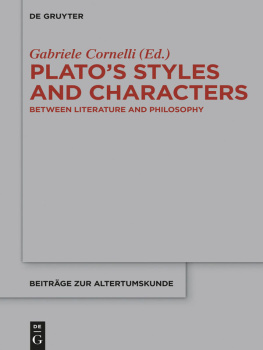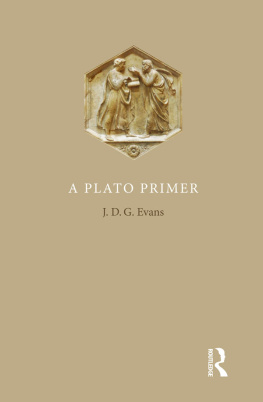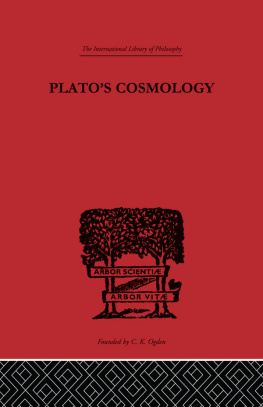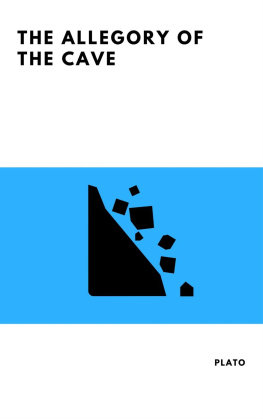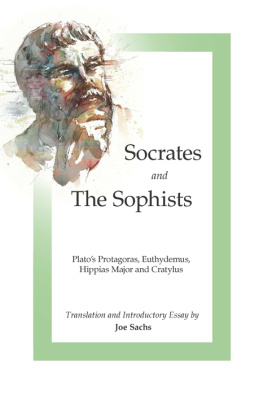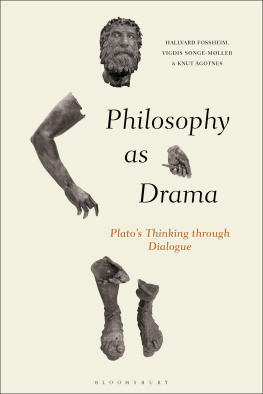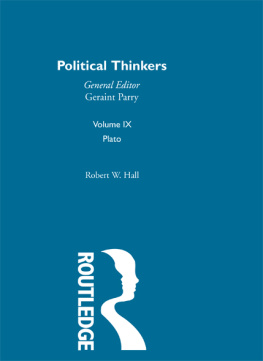Gabriele Cornelli (Ed.)
Platos Styles and Characters
Beitrge zur Altertumskunde
Herausgegeben von Michael Erler, Dorothee Gall, Ludwig Koenen und Clemens Zintzen
Band 341

The publication of this book has been supported by the International Plato Society, the Archai UNESCO Chair / Universidade de Braslia and the CAPES/ Coordenao de aperfeioamento de pessoal de nvel superior/ Ministry of Education/Brazil.

ISBN 978-3-11-044403-2
e-ISBN (PDF) 978-3-11-044560-2
e-ISBN (EPUB) 978-3-11-043654-9
ISSN 1616-0452
Library of Congress Cataloging-in-Publication Data
A CIP catalog record for this book has been applied for at the Library of Congress.
Bibliographic information published by the Deutsche Nationalbibliothek
The Deutsche Nationalbibliothek lists this publication in the Deutsche Nationalbibliografie; detailed bibliographic data are available on the Internet at http://dnb.dnb.de.
2016 Walter de Gruyter GmbH, Berlin/Boston
www.degruyter.com
To Samuel Scolnicov (19412014)
Table of Contents
Samuel Scolnicov
Ral Gutirrez
Mary Louise Gill
Mara Anglica Fierro
Lucas Soares
Graciela E. Marcos de Pinotti
Jos Trindade Santos
Michael Erler
Dino De Sanctis
Gilmrio Guerreiro da Costa
Marcus Mota
Mario Regali
Fernando Muniz
Mauro Tulli
Fernando Santoro
lvaro Vallejo Campos
Silvio Marino
Esteban Bieda
Beatriz Bossi
Gabriele Cornelli
Debra Nails
Francisco Bravo
Michele Corradi
Marcelo D. Boeri
Christian Keime
Introduction
The significance of Platos literary style to the content of his ideas is perhaps one of the central problems in the study of Plato and Ancient Philosophy as a whole. As Samuel Scolnicov pointed out in this collection, many other philosophers have employed literary techniques to express their ideas, just as many literary authors have exemplified philosophical ideas in their narratives, but for no other philosopher does the mode of expression play such a vital role in their thought as it does for Plato. And yet, even after two thousand years, there is still no consensus about the reason why Plato expresses his ideas in this distinctive style. Selected from the first Latin American Area meeting of the International Plato Society (www.platosociety.org) in Brazil (2024th August, 2012), the following collection of essays presents some of the most recent scholarship from around the world on the wide range of issues related to Platos dialogue form. The meeting was organized by Archai Unesco Chair on The Plural Origins of Western Thought of the University of Brasilia (www.archai.unb.br) and the Platonists Brazilian Society (www.platao.org), with a generous support of the International Plato Society, University of Brasilia and the Coordination for the Improvement of Higher Education Personnel (CAPES) of the Brazilian Ministry of Higher Education.
Scholars in Platonic studies gathered together at this conference and explored new paths of research in the field, despite the divergence of opinion among the participants, at the end. There is a lot to be learnt from a closer examination of Platos literary art of writing philosophy in its cultural and historical context. Understanding how Plato turned the various styles and devices of his predecessors into elements of his own writing is a key step in assessing the real singularity of his writing and the conception of philosophy it conveys. Platos use of characters is one of the exciting fields of research now on the table. As central feature of Platos way of writing philosophy, it that needs to be understood in its singularity in comparison to others genres of writing also using characters before him poetry, history, etc.
The contributions can be divided into three categories. The first addresses general questions concerning Platos literary style. The second concerns the relation of his style to other genres and traditions in Ancient Greece. And the third examines Platos characters and his purpose in using them.
Samuel Scolnicov, Ral Gutirrez, and Mary Louise Gill address the general question of the dialogue form for Platos thought. Mara Anglica Fierro and Lucas Soares explain Platos use of specific literary devices, such as myth, allegory, perspective, and prolepsis. And Graciela E. Marcos de Pinotti and Jos Trindade Santos reflect upon Platos use of language in the development of his arguments.
Michael Erler and Dino De Sanctis provide comparisons of the dialogues with other narrative styles of the time. Gilmrio Guerreiro da Costa, Marcus Mota, Fernando Muniz, Mario Regali, Mauro Tulli, and Fernando Santoro address the relation of Platos thought and writing to Ancient Greek poetry. lvaro Vallejo Campos and Silvio Marino explore the use of medical terminology and ideas in the dialogues. Esteban Bieda and Beatriz Bossi discuss Platos complex relation towards the use of rhetoric in philosophic teaching.
Gabriele Cornelli, Debra Nails, Francisco Bravo, and Michele Corradi address the question of the relation between Platos characters and the historical individuals they represent, while Marcelo D. Boeri and Christian Keime examine the purpose of the characters in the dialogues.
Through these essays readers will have an understanding of the complexity of issues surrounding Platos combination of literature and philosophy. They will also be able to access the most recent developments on these topics from various approaches from the analytic to the continental, from the established traditions in Europe and North America to the emerging Platonic scholarship in South America.
I would like to express my deepest gratitude to the Archai team for help me to organize the venue in such an effective way, and especially to Nicholas Riegel, who worked very hard on the revision of the papers here published.
A last remark is very much needed. Samuel Scolnicov, one of the authors of this book, died in August 13, 2014, while this book was being prepared. Samuel was born on March 11, 1941 in Brazil and immigrated to Israel in 1958. His outstanding scholarly productivity is very well known: he wrote not only in English, but also in his native Portuguese and in Hebrew. He was between the small group of international Plato scholars who founded the International Plato Society in 1989, and served as its President from 19982001. Samuel truly embodied the ideals of the IPS, moving easily among numerous languages and cultures, and among the diversity of approaches to Platonic studies. Dedicating this book to him seemed the most natural thing to do. Saudades , Samuel.
Gabriele Cornelli
President of the International Plato Society
Platos Literary Style
Next page
